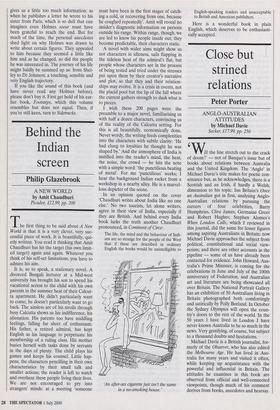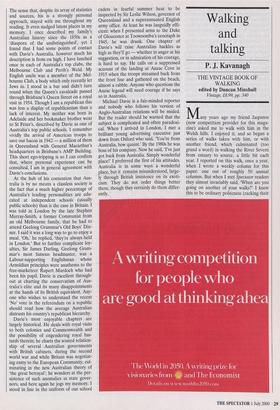Close but strined relations
Peter Porter ANGLO-AUSTRALIAN ATTITUDES by Michael Davie Secker, £17.99, pp. 250 ill the line stretch out to the crack of doom?' — not of Banquo's issue but of books about relations between Australia and the United Kingdom. The 'Anglo' in Michael Davie's title makes for poetic con- sonance but, as he acknowledges, there is a Scottish and an Irish, if hardly a Welsh, dimension to his topic. Ian Britain's Once an Australian got in first, analysing Anglo- Australian relations by pursuing the careers of four celebrities, Barry Humphries, Clive James, Germaine Greer and Robert Hughes; Stephen Alomes's When London Calls, which I reviewed in this journal, did the same for lesser figures among aspiring Australians in Britain; now Michael Davie approaches the subject from political, constitutional and social view- points; and there are other accounts in the pipeline — some of us have already been contacted for evidence. John Howard, Aus- tralia's Prime Minister, is coming for the celebrations in June and July of the 100th anniversary of Federation, and Australian art and literature are being showcased all over Britain. The National Portrait Gallery has an exhibition of 50 Australians living in Britain photographed both comfortingly and satirically by Polly Borland. In October the Sydney Olympics will open the coun- try's doors to the rest of the world. In the 50 years I have lived in London I have never known Australia to be so much in the news. Very gratifying, of course, but subject to a thousand doubts and hesitations.
Michael Davie is a British journalist, for- merly of the Observer, who has also edited the Melbourne Age. He has lived in Aus- tralia for many years and visited it often, while keeping up acquaintance with the powerful and influential in Britain. The attitudes he examines in this book are observed from official and well-connected viewpoints, though much of his comment derives from books, anecdotes and hearsay. The sense that, despite its array of statistics and sources, his is a strongly personal approach, stayed with me throughout my reading. It even nudged latent places in my memory. I once described my family's Australian history since the 1850s as a `diaspora of the undistinguished', yet I found that I had some points of contact with Davie's Australia, however much his description is from on high. I have lunched once in each of Australia's top clubs, the Melbourne Club and Perth's Weld. My English uncle was a member of the Mel- bourne Club, a body which only recently let Jews in. I stood in a bar and didn't turn round when the Queen's cavalcade passed through Brisbane's Queen Street on a royal visit in 1954. Though I am a republican this was less a display of republicanism than a lack of interest. My mother was born in Adelaide and her bookmaker brother went to St Peter's, described by Davie as one of Australia's top public schools. I remember vividly the arrival of American troops to save our bacon in 1942 — a million of them in Queensland with General Macarthur's headquarters in Brisbane's AMP Building. This short ego-tripping is so I can confirm that, where personal experience can be consulted, I am in general agreement with Davie's conclusions.
At the hub of his contention that Aus- tralia is by no means a classless society is the fact that a much higher percentage of Australia's leading personalities are edu- cated at independent schools (usually public schools) than is the case in Britain. I was told in London by the late Stephen Murray-Smith, a former Communist from an old Melbourne family, that he had to attend Geelong Grammar's Old Boys' Din- ner. I said it was a long way to go to enjoy a meal. 'Oh,' he replied, 'they're always held in London.' But to further complicate loy- alties, Sir James Darling, Geelong Gram- mar's most famous headmaster, was a Labour-supporting Englishman whose Arnoldian principles were anathema to the free-marketeer Rupert Murdoch who had been his pupil. Davie is excellent through- out at charting the conservatism of Aus- tralia's elite and its many disappointments at the hands of its British equivalent. Any- one who wishes to understand the recent `No' vote in the referendum on a republic should read how the average Australian distrusts his country's republican hierarchy.
Davie's most enjoyable chapters are largely historical. He deals with royal visits to both colonies and Commonwealth and the possibility of engendering royal bas- tards therein; he charts the soured relation- ship of several Australian governments with British cabinets, during the second world war and while Britain was negotiat- ing entry to the European Community, cul- minating in the new Australian theory of `the great betrayal'; he wonders at the per- sistence of such anomalies as state gover- nors, and here again he jogs my memory. I stood in line in the uniform of our school cadets in fearful summer heat to be inspected by Sir Leslie Wilson, governor of Queensland and a superannuated English army office. At least he was languidly effi- cient: when I presented arms to the Duke of Gloucester at Toowoomba's cenotaph in 1945, he was drunk. One chapter of Davie's will raise Australian hackles as high as they'll go — whether in anger at his suggestion, or in admiration of his courage, is hard to say. He calls on a suppressed account of the landing at Anzac Cove in 1915 when the troops streamed back from the front line and gathered on the beach, almost a rabble. Anyone who questions the Anzac legend will need courage if he says so in Australia.
Michael Davie is a fair-minded reporter and nobody who follows his version of Anglo-Australian relations will be misled. But the reader should be warned that the subject is complicated and often paradoxi- cal. When I arrived in London, I met a brilliant young advertising executive just down from Oxford who said, 'You're from Australia, how quaint.' By the 1980s he was boss of his company. Now he said, 'I've just got back from Australia. Simply wonderful place!' I pieferred the first of his attitudes. Australia is in some ways a wonderful place, but it remains misunderstood, large- ly through British insistence on its exoti- cism. They do not order things better there, though they certainly do them differ- ently.



























































 Previous page
Previous page